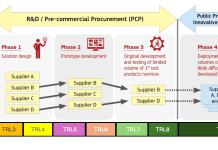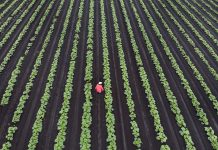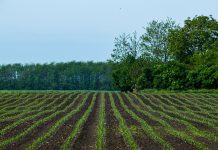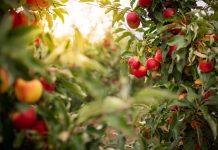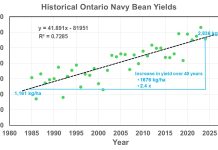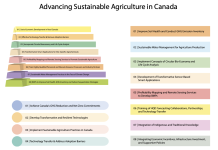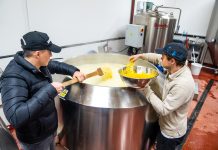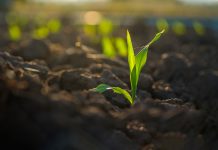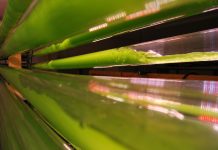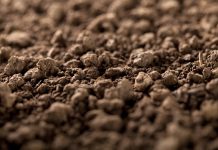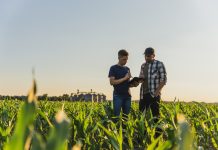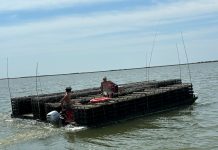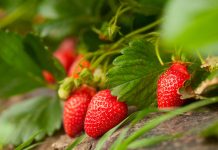Open Access Government produces compelling and informative news, publications, eBooks, and academic research articles for the public and private sector looking at health, diseases & conditions, workplace, research & innovation, digital transformation, government policy, environment, agriculture, energy, transport and more.
Home 2025
Archives
How innovation procurement can boost European water resilience
As Europe faces rising water crises, PCP WISE brings innovation procurement to the forefront to develop smarter, scalable tools for real-time water management and climate resilience.
Navigating the consumer-food interface: A regulatory perspective on plant protein in Canada
Christopher P.F. Marinangeli, PhD, RD, is the Director of the Centre for Regulatory Research and Innovation at Protein Industries Canada. He discusses the consumer-food interface from a regulatory perspective on plant protein in Canada.
Grape extracts to prevent the use of antibiotics in farmed animals
Learn about the NeoGiANT project, which focuses on the antimicrobial and antioxidant properties of grape extracts to prevent the need for antibiotics in farmed animals.
Spot farming: A novel concept for sustainable and climate-resilient crop production
Prof Dr Jens Karl Wegener from the Julius Kühn Institute in Braunschweig, Germany, discusses Spot Farming, which he considers a novel concept for sustainable and climate-resilient crop production.
CROPS4LIFE Project: Towards the decarbonisation of the agri-food system in Vitoria-Gasteiz
The CROPS4LIFE project aims to decarbonise the agri-food system, enhancing the city’s sustainability efforts. Currently, only 1.5% of fresh food consumed locally is sourced from the region. The project promotes a transition to a local, agroecological food system, focusing on short supply chains and generational renewal in farming.
Predictive models for the food industry
Gry Carl Terrell from the Danish Meat Research Institute introduces a valuable tool to maximise shelf life and ensure food safety.
A soil health initiative for revegetation and orchards
Lynette Abbott from The University of Western Australia highlights an innovative soil health initiative for revegetation and orchards.
Breaking the grass ceiling: Gender inequality in agriculture
Professor Sally Shortall guides us through GRASS CEILING, which brings together 25 partners from across Europe to research gender inequality in agricultural and rural policies.
Bean breeding at the University of Guelph: Past and present
Examine bean breeding at the University of Guelph, both past and present, conducted by its Department of Plant Agriculture.
Advancing precision agriculture for sustainable farming in Canada
Canada aims for a more sustainable and environmentally responsible agricultural sector, with precision agriculture playing a crucial role, according to Professor Aitazaz A. Farooque and Professor Qamar U. Zaman.
The role of brewing in the emerging circular economy: A case study
Freddie Ugo from Beyond Belief Brewing Co. discusses the role of brewing in the emerging circular economy by presenting a case study.
Berry industry in Alberta: Exploring the processing system
Aleksandra Tymczak studies the berry industry, an expanding industry in Alberta’s agricultural system. Here, she discusses the current capacity for processing berries as well as the challenges and emerging opportunities to develop the berry processing system.
Unleashing the potential of biology in mining and enhanced rock weathering by bridging the...
Martin Van Den Berghe, CEO of Cytochrome, along with Jayme Feyhl-Buska and Paul Reginato of Homeworld Collective, explore the potential of biology in mining and enhanced rock weathering by bridging the gap between academia and industry.
SoilTribes: Glocal ecosystems restoring soil values, roles and connectivity
This analysis explores how creativity, knowledge-sharing, and the empowerment of local communities can transform our understanding of soil value and protection, focusing on global and local ecosystems that restore soil’s values, roles, and connectivity.
Microalgae as a novel, non-animal source of long-chain omega-3 fatty acids and vitamin D
Charlotte Jacobsen and Emil Gundersen from the National Food Institute at the Technical University of Denmark emphasize the need for new plant-based sources of omega-3 fatty acids and vitamin D3, highlighting microalgae as a promising option and discussing the challenges in harnessing it.
Horticulture: Hormonal therapy for grapevines
Jim Willwerth, Assistant Professor and Researcher at Brock University, Canada, in this horticulture discussion, delves into what we need to know about hormonal therapy for grapevines, including plant growth regulators.
Soil biological amendments for soil health
Lynette Abbott and Bede Mickan from The University of Western Australia, provide insights into research on enhancing soil health using biological amendments.
Are we on the verge of a fourth agricultural revolution?
In this insightful analysis, Professor Guillaume Blanchet from Université de Sherbrooke examines whether we are on the verge of a fourth agricultural revolution and explores new technologies for agroecology.
A new wave in oyster farming: Making oysters cheaper than chicken
After a 37-year career as Lead Seafood Microbiologist at the USFDA, Dr Angelo DePaola decided to tackle a different challenge: oyster farming.
Berry production in Alberta: Improving production system through research
Aleksandra Tymczak studies the berry industry – an expanding industry in Alberta’s agricultural system. Here, she discusses the research activities occurring within the horticulture industry and the impact on berry production and berry producers.

